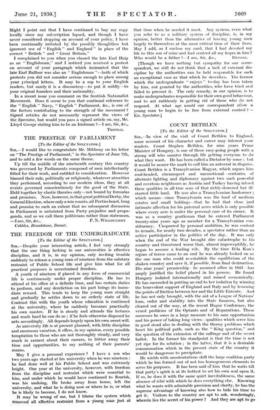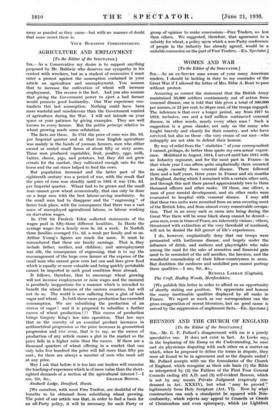COUNT BETHLEN [To the Editor of the SPECTATOR.] SIR, —In view
of the visit of Count Bethlen to England. some account of his character and career may interest your readers. Count Stephen Bethlen, for nine years Prime Minister of Hungary, is one of those easy-going people with a strong will who saunter through life getting everyone to do what they want. He has been called a Dictator by some ; but it would be nearer the mark to call him an autocrat in disguise. Count Bethlen is a Transylvanian Magyar, which argues him cool-headed, circumspect and unemotional—centuries of alternate fighting and diplomacy against two such powerful and covetous neighbours as Austria and Turkey having inbred these qualities in all true sons of that richly-dowered but ill- starred little land. He was also a Transylvanian landoWner ; which means—since Transylvania was the land of mediuni estates and small holdings—that he had that close :and intimate affection for his paternal acres which is only possible where every acre is under the personal care of its owner. It was as a country gentleman that he entered Parliament twenty-nine years ago as member for a Transylvanian con- stituency. Unspurred by personal ambition, he was content to remain, for nearly two decades, a spectator rather than an active participator in the politics of the day. It was only when the end of the War brought dire catastrophe to his country and threatened worse that, almost imperceptibly, he began to assume a leading role. By the time Bela Kun's rime of terror came to an end he was already looked on as the one man who could re-establish the equilibrium of the shaken country and save it, if possible, from final destruction. His nine years' premiership—he assumed office in 1921—has amply justified the belief placed in his powers. He found Hungary isolated internationally and ruined economically. He has succeeded in putting an end to her isolation by winning the benevolent support of England and Italy and by lessening the points of friction between her and the Little Entente. And he has not only brought, with the aid of a League of Nations' loan, order and stability into the State finances, but also cleared out of the way, at the recent Hague Conference, the vexed problems of the Optants and of Reparations. These successes he owes in a large measure to his sane opportunism and his power of taking long views—qualities which serve him in good stead also in dealing with the thorny problems which beset his political path, such as the " King question," and the question of the extension of the suffrage and of the secret ballot. In the former his standpoint is that the time is not yet ripe for its solution ; in the latter, that it is a desirable consummation which in the present state of the country it would be dangerous to precipitate.
He wields with unostentatious skill the large coalition party which he has formed out of not too homogeneous elements to serve his purposes. It has been said a him that he waits till that party's spirit is at its hottest to set his own seal upon it. If so, he does it with the same quiet inevitableness, the same absence of eclat with which he does everything else. Knowing what he wants with admirable precision and clarity, he has the supreme advantage of knowing also how to bide his time to get it. Visitors to the country are apt to ask, wonderingly, wherein lies the secret of his power ? And they are apt to go
away as puzzled as they came—but with no manner of doubt that some secret there is.
YOUR BUDAPEST CORRESPONDENT.









































 Previous page
Previous page